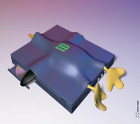Why I love Slackware Linux
I've always wanted to share my experiences with Slackware, so here goes.
NOTE: this page is old, so your mileage may
vary.
I tried several Linux distributions. Among them, Redhat, Mandrake, Lycorise, Suse 8.2/9.0 (I bought a copy of Suse 8.2), Knoppix, Smoothwall 2.0 Linux, Gentoo, Corel Linux (back in 2000!), College Linux, etc. You name it, I've probably tried it.
I believe that it is important for Linux newbies to try out ALL the distributions, then pick the one they like. I fell in love with Slackware, but that doesn't mean it's the best distribution.
Slackware is rock-stable. At first I had a horrible time with the machine I was using Linux on.It was a given-to-me PCChips M758LMR-motherboard-based machine. It was a piece of krap. The motherboard was dying. One day I decided to run SuSE's memory test utility on my machine (thanks, SuSE!), and it found a ton of memory problems. I knew the RAM was new, so I thought to myself, "hmmm, trust Kingston ram, or trust PCChips?" Eventually my decision was made for me: my motherboard died. I went and bought an Intel D815EFV, and my problems were solved.
But Slackware, amid all that, was more stable than all other distributions, even on an unstable motherboard. Once my new motherboard was in use, Slackware proved itself solid as titanium. I've never had a problem with Slackware that wasn't something I caused.
While Slackware at first glance doesn't seem specifically compiled for your machine, this is explainable. The quote from Patrick Volkerding himself: "There is essentially no difference in speed between -march=i686, and -march=i486 -mcpu=i686 (which Slackware uses). Run benchmarks and you'll see. By going -march=i686 all you're doing is preventing people with old machine from running the software." It is fast. It isn't compiled with lots of bells and whistles like some of the more user-friendly distributions, which is also a reason that Slackware is fast. The Linux kernel might not seem fast due to booting with LILO, but this is because Slackware doesn't default to using the "compact" option in LILO. Add this and you will be surprised how fast it loads the kernel. Also, Slackware is "unix-like", which means that you need to do everything yourself mainly. You can fine tune Slackware to boot faster and run faster than most distributions of Linux.
Slackware's Features:
While Slackware may not come with your favorite applications, this is because it picks the "best of the breed" applications to ship with. If you're sick of the "same old XMMS", you might not like Slackware. However, philosophically Slackware picks the "best tool for the job" rather than give you "every tool to do the same job". The philosophy of Slackware is also a very good influence on those using it. I've learned more from using Slackware by going and finding the information for my- self than I have with other distributions that do things for me.
The defaults out-of-the-box are nice. However, once can easily upgrade to the newest kernel version using packages, and it's actually not hard. Just make sure you do it right. Follow the directions, and Slackware works exactly as advertised. As for hackability, i.e. the ability to modify the installation to be more secure, Slackware is the top of the line.
There are also several papers about how to further secure Slackware. One of my favorites is "Securing Slackware 8.0" by Peter Seth DeVries, found here, courtesy of SANS.org.But securing Slackware is easier because the system itself is simpler. In fact, that's part of what makes Slackware so nice is "beauty in simplicity". For example, you can directly modify /etc/fstab to tell Slackware to mount /boot as read-only (assuming you set up your partitions the right way). Also, most papers and documentation on security work well in Slackware (assuming that these documents have generic Linux / Unix in mind), due to Slackware acting very much like Unix / Linux open standards desire. Slackware has been called the "most Unix-like" Linux distribution.
I have listed why I prefer Slackware. By all means, try all the Linux distributions out. While Slackware isn't really for "newbies", I "cut my teeth" on it, and I've enjoyed it ever since. It's quite easy to contribute as well: just simply download and install Slackware-current.Slackware-current is a work in progress, so it is considered stable, although a lot of people use it and have no major issues.
And Slackware is the best Linux distribution. I prefer to think of Linux distributions as equals in a sense. This is the beauty of open source: try them all if you want, and choose which one you'd prefer to use.


